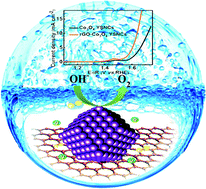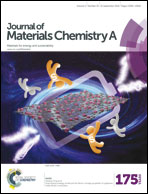Facile synthesis and excellent electrochemical performance of reduced graphene oxide–Co3O4 yolk-shell nanocages as a catalyst for oxygen evolution reaction
Abstract
The development of highly active, inexpensive and clean catalysts for applications in the oxygen evolution reaction (OER) is very important for energy storage and conversion. In this study, a reduced graphene oxide–Co3O4 yolk-shell nanocage (rGO–Co3O4 YSNC) composite material is prepared through a facile precipitation reaction with subsequent calcination and hydrothermal treatment. A strong chemical interaction formed between Co3O4 YSNCs and r-GO nanosheets is vital to produce a well wrapped composite material. This specific composite structure combines the high conductivity of r-GO together with the promising catalytic properties of the highly porous Co3O4 YSNCs, therefore the enhanced OER activity and stability is realized. The Tafel slope, current density at an overpotential of 450 mV and the overpotential at 10.0 mA cm−2 for the rGO–Co3O4 YSNC composite electrode are 84.9 mV dec−1, 19.9 mA cm−2 and 410 mV, respectively. Moreover, the composite electrode exhibits 2.8% attenuation of the current density after the 500th cyclic voltammetry test. These results are comparable to the currently reported high-performance OER catalysts, which prove that the rGO–Co3O4 YSNC composite material is a potential catalyst for oxygen evolution reactions.


 Please wait while we load your content...
Please wait while we load your content...